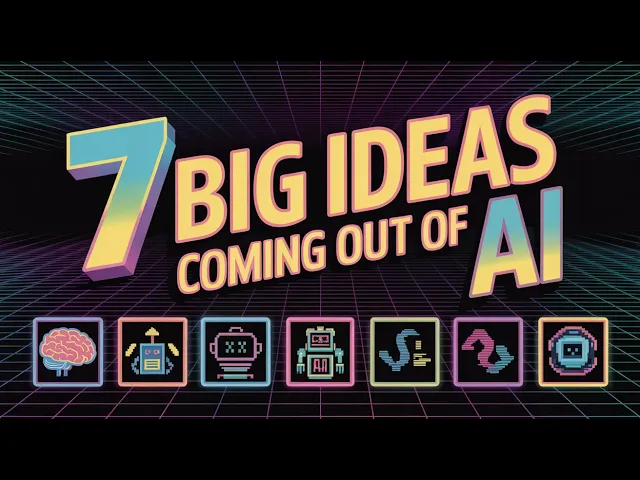Ambient Agents and 6 Other Big Ideas Coming Out of AI

Ambient agents transform how we'll use AI
In the rapidly evolving world of artificial intelligence, keeping track of transformative ideas can feel like trying to drink from a firehose. Sam Altman's recent discussion about "ambient agents" and other emerging AI concepts provides a fascinating glimpse into how our digital assistants might soon become more deeply integrated into our daily lives. Rather than the reactive, command-based AI we're familiar with today, these ambient agents represent a shift toward proactive digital companions that anticipate our needs and quietly enhance our productivity.
Key insights from Sam Altman's vision
-
Ambient agents will operate continuously in the background, monitoring our digital activities to offer help precisely when needed without explicit prompting—essentially creating an AI that's "always there" but only intervenes when truly useful.
-
Task integration capabilities will enable AI to combine understanding of multiple systems, allowing it to perform complex multi-step processes like planning a trip by coordinating between various applications and services autonomously.
-
Multi-modal intelligence represents a significant leap forward, with AI systems that can process and generate content across various formats (text, images, video, audio) simultaneously, creating more natural and comprehensive interactions.
Why ambient AI matters now
The most compelling aspect of Altman's vision is how ambient agents fundamentally reframe our relationship with AI. Today's interaction model—where we must explicitly summon and instruct AI assistants—creates significant friction. The cognitive load of having to decide when to use AI and how to phrase our requests limits its utility. Ambient agents eliminate this friction by proactively offering assistance based on context, effectively becoming an extension of our cognitive process rather than a separate tool.
This shift matters enormously for productivity and knowledge work. Consider how much mental energy is currently wasted on administrative tasks, information retrieval, and coordination activities. An ambient agent that understands your workflow could draft emails based on previous conversations, prepare meeting notes before you ask, or quietly organize information it knows you'll need later. The productivity implications are profound, potentially freeing knowledge workers to focus exclusively on creative and strategic thinking.
Beyond the obvious: Hidden implications
What Altman didn't fully explore is how ambient agents might reshape organizational knowledge management. Today's companies struggle with institutional memory—valuable insights and context often remain trapped in individual employees' heads or buried in dis
Recent Videos
How To Earn MONEY With Images (No Bullsh*t)
Smart earnings from your image collection In today's digital economy, passive income streams have become increasingly accessible to creators with various skill sets. A recent YouTube video cuts through the hype to explore legitimate ways photographers, designers, and even casual smartphone users can monetize their image collections. The strategies outlined don't rely on unrealistic promises or complicated schemes—instead, they focus on established marketplaces with proven revenue potential for image creators. Key Points Stock photography platforms like Shutterstock, Adobe Stock, and Getty Images remain viable income sources when you understand their specific requirements and optimize your submissions accordingly. Specialized marketplaces focusing...
Oct 3, 2025New SHAPE SHIFTING AI Robot Is Freaking People Out
Liquid robots will change everything In the quiet labs of Carnegie Mellon University, scientists have created something that feels plucked from science fiction—a magnetic slime robot that can transform between liquid and solid states, slipping through tight spaces before reassembling on the other side. This technology, showcased in a recent YouTube video, represents a significant leap beyond traditional robotics into a realm where machines mimic not just animal movements, but their fundamental physical properties. While the internet might be buzzing with dystopian concerns about "shape-shifting terminators," the reality offers far more promising applications that could revolutionize medicine, rescue operations, and...
Oct 3, 2025How To Do Homeless AI Tiktok Trend (Tiktok Homeless AI Tutorial)
AI homeless trend raises ethical concerns In an era where social media trends evolve faster than we can comprehend them, TikTok's "homeless AI" trend has sparked both creative engagement and serious ethical questions. The trend, which involves using AI to transform ordinary photos into images depicting homelessness, has rapidly gained traction across the platform, with creators eagerly jumping on board to showcase their digital transformations. While the technical process is relatively straightforward, the implications of digitally "becoming homeless" for entertainment deserve careful consideration. The video tutorial provides a step-by-step guide on creating these AI-generated images, explaining how users can transform...
